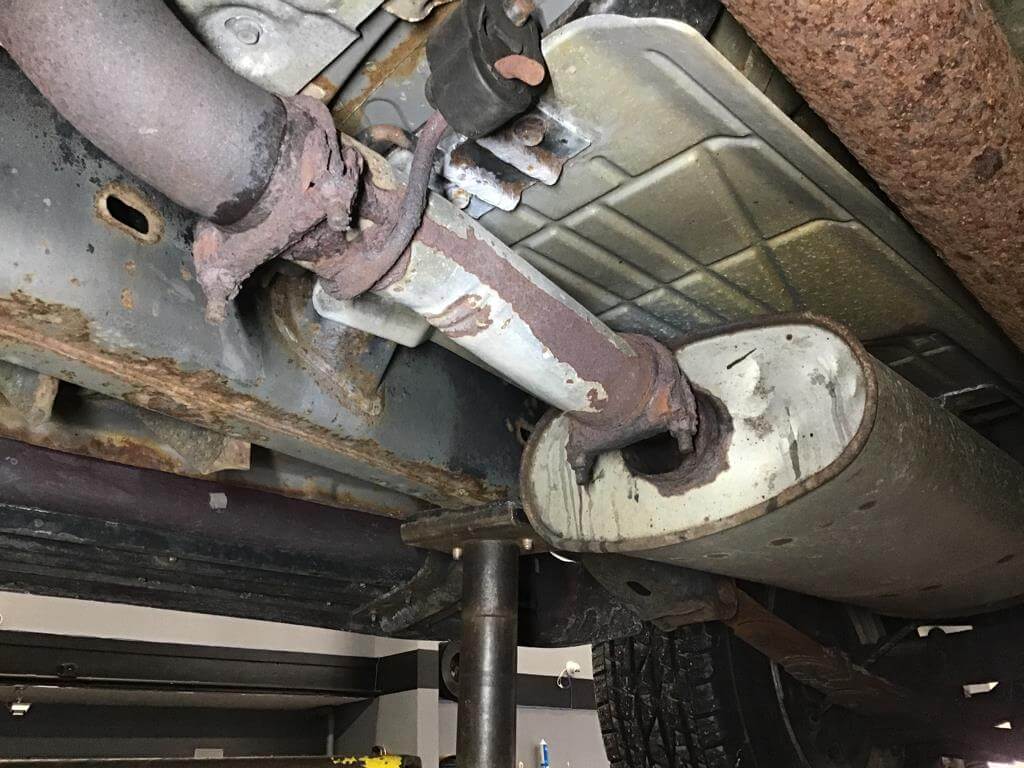Is your car making strange noises? Do you notice a decrease in engine performance and fuel efficiency? If so, it might be time to check on your muffler. The muffler plays a crucial role in reducing noise and controlling emissions in your vehicle’s exhaust system. However, over time, it can become worn out, leading to a range of issues. In this guide, we will explore some key indicators that can help you determine if your muffler is bad. By understanding these signs, you can promptly address any potential problems and ensure your car runs smoothly and quietly on the road. So, let’s dive in and learn how to tell if your muffler needs attention before it causes further damage to your vehicle and your ears!
How to Tell if Your Muffler is Bad:
- Start your vehicle and listen for excessive noise or rattling coming from the muffler.
- Check for any visible signs of damage, such as rust, holes, or leaks.
- Inspect the exhaust fumes for unusual smells, such as a strong fuel odor.
- Feel for any vibration or loss of power when driving.
- Compare the sound and performance of your vehicle’s exhaust system to its normal state.

How to Tell if Your Muffler is Bad
Are you noticing a change in the sound of your vehicle? Does it seem louder than usual? If so, it’s possible that your muffler is experiencing some issues. The muffler plays a crucial role in reducing noise and controlling emissions in your vehicle’s exhaust system. In this article, we will guide you on how to tell if your muffler is bad, helping you identify the signs of a failing muffler.
Step 1: Listen for Unusual Noises
One of the most obvious signs of a bad muffler is an increase in noise. If you notice that your vehicle’s exhaust sound is louder than usual or if you hear a deep rumbling noise, it could be a sign of a failing muffler. Pay attention to any hissing or popping sounds as well. These noises could indicate leaks or blockages in the muffler, which can affect its performance.
Additionally, if you hear any rattling or vibrating sounds coming from the muffler area, it might be a sign of internal damage. This could be caused by loose or broken components inside the muffler. In such cases, it is important to address the issue promptly to prevent further damage to your vehicle’s exhaust system.
Step 2: Check for Exhaust Leaks
Another way to determine if your muffler is bad is by checking for exhaust leaks. Start by inspecting the muffler visually. Look for any visible signs of damage such as rust, holes, or cracks. These are indications that the muffler is not functioning properly and may need to be replaced.
Next, you can perform a simple test to check for exhaust leaks. Start your vehicle and let it idle for a few minutes. Then, carefully place your hand near the joints and connections of the muffler. If you feel any hot air blowing out or notice a strong smell of exhaust fumes, it could be a sign of a leak in the muffler. It is crucial to address these leaks promptly, as they can lead to poor fuel efficiency and increased emissions.
Step 3: Consider Performance and Fuel Efficiency
A failing muffler can also have an impact on your vehicle’s performance and fuel efficiency. If you notice a decrease in power or acceleration, it could be due to a restricted exhaust flow caused by a faulty muffler. Similarly, if you find yourself refueling more frequently than usual, it might be a result of poor fuel efficiency caused by a bad muffler.
Keep in mind that these symptoms can also be related to other issues with your vehicle. Therefore, it is recommended to have a professional mechanic inspect your vehicle to accurately diagnose the problem and determine if the muffler is indeed the cause.
Step 4: Look for Signs of Corrosion
Corrosion is a common issue that can affect the lifespan and performance of your muffler. Over time, exposure to moisture, road salt, and other environmental factors can cause the muffler to corrode. Inspect the muffler for signs of rust or corrosion, especially in areas where the metal is exposed. Corroded mufflers are more prone to developing cracks or holes, which can lead to leaks and a decrease in performance.
If you notice significant corrosion on your muffler, it is advisable to have it replaced to prevent further damage and ensure the proper functioning of your vehicle’s exhaust system.
Step 5: Seek Professional Assistance
If you have followed the previous steps and suspect that your muffler is indeed bad, it is best to seek the help of a professional mechanic. They have the expertise and tools to accurately diagnose the issue and provide the necessary repairs or replacements. Attempting to fix the muffler on your own without proper knowledge and equipment can lead to further damage or potential safety hazards.
Remember, a well-maintained muffler is essential for a quiet and efficient vehicle. By paying attention to the signs mentioned in this article and seeking professional assistance when needed, you can ensure the longevity and optimal performance of your muffler and exhaust system.
Frequently Asked Questions
Here are some commonly asked questions about how to tell if your muffler is bad:
1. How can I tell if my muffler is bad?
If you suspect that your muffler is bad, there are several signs you can look out for. Firstly, listen for any unusual noises coming from your exhaust system. A bad muffler may produce a loud rumbling or hissing sound. Additionally, if you notice a decrease in your vehicle’s overall performance, such as a loss of power or acceleration, it could be a sign of a faulty muffler. Finally, visually inspect your muffler for any visible signs of damage or rust, as this can indicate a problem. If you notice any of these signs, it is recommended to have your muffler checked by a professional.
It is important to address a bad muffler in a timely manner, as it can lead to other issues with your vehicle. A malfunctioning muffler can negatively affect your engine’s performance, fuel efficiency, and emissions. It can also potentially lead to more serious problems with your exhaust system. Therefore, if you suspect that your muffler is bad, it is best to have it inspected and repaired as soon as possible.
2. Can a bad muffler affect my vehicle’s performance?
Yes, a bad muffler can definitely affect your vehicle’s performance. One of the most common signs of a bad muffler is a decrease in power or acceleration. This is because a faulty muffler can restrict the flow of exhaust gases, leading to a decrease in engine efficiency. Additionally, a damaged or clogged muffler can cause backpressure to build up in the exhaust system, which can further impact performance.
Furthermore, a bad muffler can also negatively affect your fuel efficiency. When the exhaust system is not functioning properly, it can disrupt the air-to-fuel ratio needed for efficient combustion. This can result in increased fuel consumption and decreased mileage. Therefore, if you notice any performance issues with your vehicle, it is worth checking the condition of your muffler.
3. Are there any visual signs of a bad muffler?
Yes, there are some visual signs that can indicate a bad muffler. One of the most obvious signs is visible damage or corrosion on the muffler itself. Rust, holes, or cracks in the muffler can all indicate a problem. Additionally, if you notice any black soot or residue around the muffler or exhaust pipes, it could be a sign of a leak or malfunction. It is also worth checking the exhaust system for any loose or hanging components, as this can also indicate a problem with the muffler.
While visual signs alone may not always be conclusive, they can provide important clues about the condition of your muffler. If you notice any of these visual signs, it is recommended to have your muffler inspected by a professional to determine the extent of the damage and the necessary repairs.
4. Can a bad muffler affect my vehicle’s emissions?
Yes, a bad muffler can have a significant impact on your vehicle’s emissions. The primary function of the muffler is to reduce the noise produced by the exhaust gases, but it also plays a role in controlling emissions. A malfunctioning or damaged muffler can disrupt the proper flow of exhaust gases, leading to increased emissions. This can result in your vehicle failing emission tests or exceeding the legal limits set by environmental regulations.
In addition to increased emissions, a bad muffler can also affect the composition of the exhaust gases. If the muffler is not functioning properly, it may not be able to properly filter out harmful pollutants, such as carbon monoxide. This can have detrimental effects on both the environment and your health. Therefore, it is important to address any issues with your muffler to ensure that your vehicle meets the necessary emission standards.
5. Can I replace a bad muffler myself?
While it is possible to replace a bad muffler yourself, it is generally recommended to have it done by a professional. Replacing a muffler involves working with the exhaust system, which can be complex and potentially dangerous if not done correctly. A professional mechanic will have the necessary tools, equipment, and expertise to safely and efficiently replace your muffler.
In addition, a professional can also inspect the entire exhaust system to ensure that there are no other underlying issues that need to be addressed. They can also recommend the most suitable replacement muffler for your vehicle, taking into account factors such as performance, noise reduction, and emissions. Overall, while it may be tempting to save money by replacing the muffler yourself, it is best to leave this job to the professionals to ensure a proper and safe installation.

What Are The Symptoms of a Bad Muffler? | Dependable Car Care | Ventura, CA
In conclusion, understanding how to tell if your muffler is bad is crucial for maintaining the overall health and performance of your vehicle. By paying attention to warning signs such as excessive noise, decreased fuel efficiency, and unusual vibrations, you can quickly identify any issues with your muffler and take appropriate action. Regular maintenance and timely repairs are essential to not only ensure a quiet and comfortable driving experience but also to prevent further damage to other components of your exhaust system. Remember, a well-functioning muffler not only promotes a quieter ride but also contributes to a cleaner environment by reducing harmful emissions. So, if you suspect that your muffler may be failing, don’t hesitate to consult a professional mechanic who can accurately diagnose the problem and provide the necessary repairs or replacements.
In conclusion, being aware of the signs that indicate a bad muffler is essential for any vehicle owner. By identifying these warning signs early on, you can prevent further damage to your exhaust system and ensure a smooth and enjoyable driving experience. Remember, a faulty muffler not only affects the noise level of your vehicle, but it can also impact fuel efficiency and contribute to harmful emissions. Therefore, it is important to prioritize regular maintenance and address any issues promptly. By doing so, you can not only extend the lifespan of your muffler but also contribute to a cleaner and quieter environment for everyone on the road.
